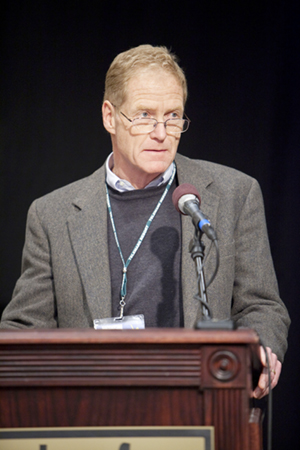 Dr. James Crow has been a major source of inspiration to me since I arrived at the University of Wisconsin and started work as a professor of plant breeding and plant genetics. I’ve routinely needed his inspiration, as do we all, in the face of the religious onslaught against the teaching of evolution.
Dr. James Crow has been a major source of inspiration to me since I arrived at the University of Wisconsin and started work as a professor of plant breeding and plant genetics. I’ve routinely needed his inspiration, as do we all, in the face of the religious onslaught against the teaching of evolution.
Millions of students are routinely denied any knowledge of evolutionary biology due to the activism of religious zealots. This is tragedy of the highest order. As many have pointed out, nothing in biology makes any sense except in light of evolution, and we need to know a lot about biology because our survival as a species depends upon it.
The religious opposition to the teaching of evolution is nothing less than a crime against humanity.
Religious opposition to teaching evolution is a crime against humanity.
This is why it is such a pleasure to introduce Jim Crow. He is one of the most respected evolutionary biologists in the world, but most importantly, he is also one of the most effective teachers of the subject.
He was born in 1916 in College-ville, Pa. Shortly thereafter, he moved to Wichita, Kan. He graduated from Friends University in 1937 and received his Ph.D. from the University of Texas in 1941. He spent the next eight years teaching and conducting research at Dartmouth College.
Crow came to UW-Madison in 1948 and published a paper affecting the trajectory of my life as well as the careers of many others. I wasn’t even born yet, nor had Watson and Crick published their landmark description of DNA.
Why was this 1948 paper so important? It was entitled “Alternative hypotheses of hybrid vigor,” and it traced back to one of Darwin’s most important observations about natural organisms, namely that “nature tells us, in the most emphatic manner, that she abhors perpetual self-fertilization” (Darwin, 1862), and later, “cross-fertilization is generally beneficial and self-fertilization injurious” (Darwin, 1876).
The generality of these observations is widely appreciated, but they also have immense practical utility. For example, the hybrid seed corn industry depends entirely on the crossing of inbred parent strains to create the marvelously productive varieties upon which the world now depends. Billions of dollars worth of seed each year are developed according to our understanding of the genetics underlying hybrid vigor. Crow’s 1948 paper settled some long-simmering controversies about the genetics of inbreeding depression and the benefits of cross-fertilization.
I arrived at the UW-Madison in 1983 as a corn geneticist and plant breeder. Jim’s 1948 paper was iconic on what was then referred to as the “overdominance theory” of hybrid vigor. I thought it was settled ground, scientifically, at least until I started attending his seminars, where, much to my surprise, Dr. Crow started arguing against his own theories! He began to proclaim that his 1948 paper was wrong.
Of course, scientific controversies are common in academic circles, but they typically involve scientists challenging other scientists’ ideas, not their own. Academic researchers whose careers are firmly rooted in such iconic pronouncements as the overdominance theory of hybrid vigor typically become obsessed with protecting their scientific turf. Not so for Crow. He began to conduct a vigorous intellectual battle with himself, and he was doing it joyfully and in public!
His new arguments were so effective that he succeeded in convincing himself and the rest of the scientific world that he was wrong in 1948, and that our theories about hybrid vigor needed revision. In 2000, he published an article entitled “The rise and fall of overdominance.” This was a great title for a great paper because Dr. Crow was largely responsible for both the rise and the fall of the theory.
As I look back on those early days when I was being initiated as a new professor, I now know how fortunate I was to witness the “rise and fall of overdominance.” Dr. Crow provided a wonderful display of intellectual integrity, dispassionate critical thought and respect for the scientific method. He always asks the hard questions, and I can’t help but contrast his behavior with those who insist on the inerrancy of obtuse, historically remote religious scripture.
I am not the only one to be impressed by his scientific integrity and productivity. He has many awards and memberships in honorary organizations, among them: National Academy of Sciences, American Philosophical Society, World Academy of Art and Science, National Academy of Medicine, American Academy of Arts and Sciences, Genetics Society of America (past president), American Society of Human Genetics (past president), Royal Society, Japan Academy (fellow), Wisconsin Academy of Sciences, Arts and Letters (fellow).
He chaired the UW Department of Medical Genetics and the Laboratory of Genetics and served as acting dean of the Medical School. In 2009, the UW named a new institute in his honor, the J.F. Crow Institute for the Study of Evolution.
The Madison community has also benefited from Dr. Crow’s generosity and talent. He was president of the Madison Civic Music Society and the Madison Symphony Orchestra, in which he played the viola.
I’d like to end by simply stating that Dr. Crow is also a man who lights up every room with his smile.
Jim Coors is professor emeritus of the Department of Agronomy and teaches population genetics, evolutionary biology and bioethics at the University of Wisconsin–Madison and has been a member of the Plant Breeding/Genetics program since 1983. He is the officer at large on the Freedom From Religion Foundation Executive Council.
Photography by Brent Nicastro
